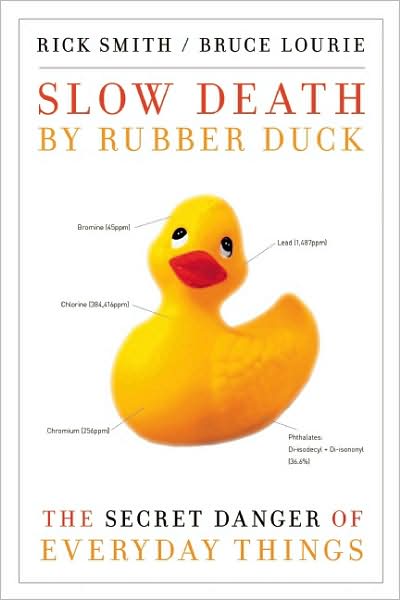Slow Death By Rubber Duck: The Secret Danger of Everyday Things will disturb you. Rick Smith and Bruce Lourie explore all the chemicals in our kitchens and pantries and bathrooms that are finding their way into our bodies. NEVER microwave plastic. That just releases carcinogens. Some might call Smith and Lourie alarmists, but clearly something is causing increases in birth defects, childhood autism, attention-deficit disorder, hormonal imbalances, and cancers. I’m not giving much away when I say that the authors strongly suspect plastics as one of the big contributors to our health problems. If you’re concerned about the environment and your personal health and safety, Slow Death By Rubber Duck is worth your time and attention.

Yikes!
*covers ears, puts head it sand*
lalalalalalalala
😉
Yikes is right, Jeff. I was freaked out by some of examples in SLOW DEATH BY RUBBER DUCK.
Oh, boy. What do they say about the containers food like Smart Ones and Lean Cuisine comes in?
The authors show how plastics just spew carcinogens when heated, Patti. I’m changing many of our menu items and heating our favorites in ceramic dishes.
Wouldn’t it be hard to remove a frozen food from one of those trays though. I will have to try it. I count on those things for lunch for weight control.
You might have to look at some safe alternatives to lunch, Patti. I eat a granola bar and a handful of almonds.
Some of them are in cardboard trays, aren’t they? I know they say “some” plastics are supposedly OK to use and others not (depending on the number on the bottom) but from what George says, it sounds like none of them are safe.
*munches raw carrot stick*
Yes, Jeff, I munch on raw carrot sticks, too. The authors also point out harmful chemicals are also in many of those anti-bacterial products so you have to be careful about those.
I suggest they a) go live off the grid and leave us alone, or b) look into all the prescription drugs the medical/industrial complex are cramming down our throats and inundating us with commercials, or c) take a harder look at industrial and fuel exhausts (factories and vehicles). There have been various kinds of processed petroleum sine the 1700 (coal tar, anyone?). Okay, there’s a downside to plastics, but there a down side to damn near everything. What kind of off-gases do you think come from the glazes on those ceramics?
You have to pick your poison, Rick. Someone like Art Scott with a chemistry background could advise us on product safety.
Anyone see the movie SAFE with Julianna Moore?
I never microwave plastics. I eat them cold.
I heard of Real Men not eating quiche, Bob, but I’ve never heard eating plastic cold. Yuck!
I don’t use anti-bacterial soaps for just that reason, George.
A surprising amount of “healthy” products are exposed as dangerous in SLOW DEATH BY RUBBER DUCK, Jeff.